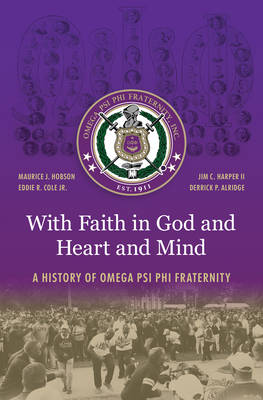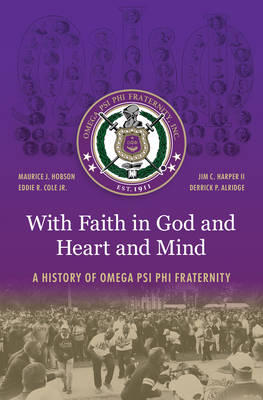
- Afhalen na 1 uur in een winkel met voorraad
- Gratis thuislevering in België vanaf € 30
- Ruim aanbod met 7 miljoen producten
- Afhalen na 1 uur in een winkel met voorraad
- Gratis thuislevering in België vanaf € 30
- Ruim aanbod met 7 miljoen producten
Zoeken
With Faith in God and Heart and Mind
A History of Omega Psi Phi Fraternity
Maurice J Hobson, Eddie R Cole, Jim C Harper, Derrick P Alridge
Hardcover | Engels
€ 45,95
+ 91 punten
Omschrijving
When Edgar A. Love, Oscar J. Cooper, Frank Coleman, and Ernest Everett Just founded the historically Black fraternity Omega Psi Phi on November 17, 1911, at Howard University, they could not have known how great of an impact their organization would have on American life. Over the 110 years that followed, its members led colleges and universities; served in prominent military roles; made innumerable contributions to education, civic society, science, and medicine; and at least one campaigned for the US presidency.
This book offers a comprehensive, authoritative history of the fraternity, emphasizing its vital role through multiple eras of the Black freedom struggle. The authors address both the individual work of its membership, which has included such figures as Carter G. Woodson, Bayard Rustin, Roy Wilkins, James L. Farmer Jr., Benjamin Elijah Mays, James Clyburn, Jesse Jackson, and Benjamin Crump, and the collective efforts of the fraternity's leadership to encourage its general membership to contribute to the struggle in concrete ways over the years. The result is a book that uniquely connects the 1910s with the present, showing the ongoing power of a Black fraternal organization to channel its members toward social reform.
This book offers a comprehensive, authoritative history of the fraternity, emphasizing its vital role through multiple eras of the Black freedom struggle. The authors address both the individual work of its membership, which has included such figures as Carter G. Woodson, Bayard Rustin, Roy Wilkins, James L. Farmer Jr., Benjamin Elijah Mays, James Clyburn, Jesse Jackson, and Benjamin Crump, and the collective efforts of the fraternity's leadership to encourage its general membership to contribute to the struggle in concrete ways over the years. The result is a book that uniquely connects the 1910s with the present, showing the ongoing power of a Black fraternal organization to channel its members toward social reform.
Specificaties
Betrokkenen
- Auteur(s):
- Uitgeverij:
Inhoud
- Aantal bladzijden:
- 384
- Taal:
- Engels
Eigenschappen
- Productcode (EAN):
- 9781469673196
- Verschijningsdatum:
- 28/01/2025
- Uitvoering:
- Hardcover
- Formaat:
- Genaaid
- Afmetingen:
- 164 mm x 236 mm
- Gewicht:
- 703 g

Alleen bij Standaard Boekhandel
+ 91 punten op je klantenkaart van Standaard Boekhandel
Beoordelingen
We publiceren alleen reviews die voldoen aan de voorwaarden voor reviews. Bekijk onze voorwaarden voor reviews.











